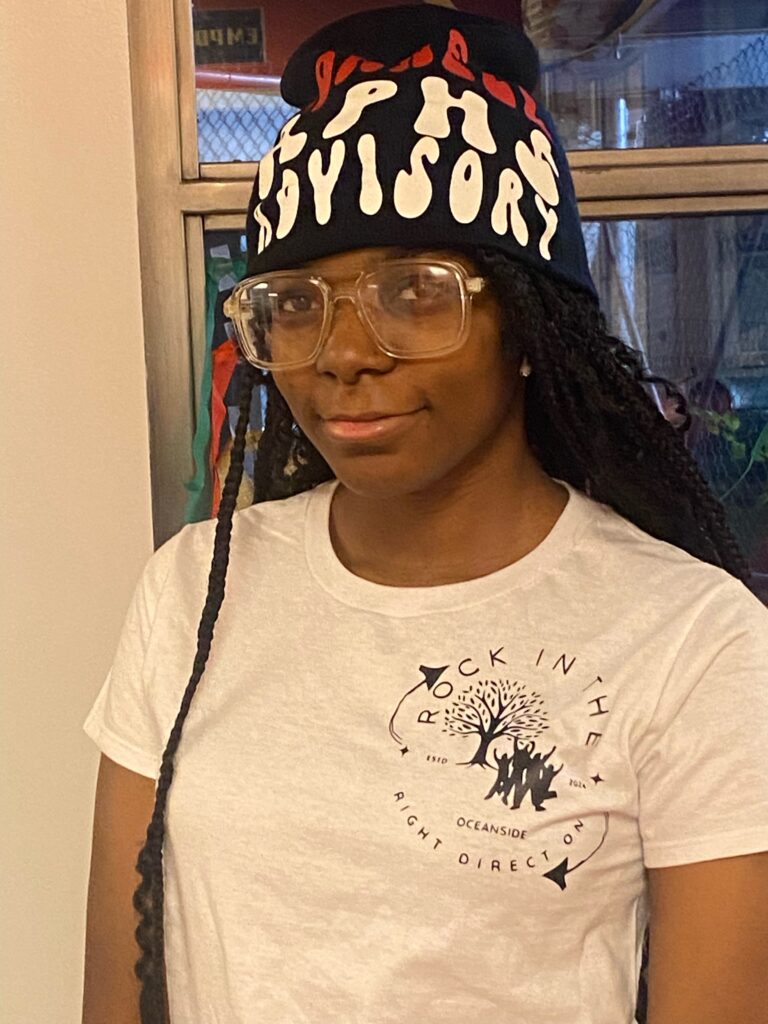Regarding Recent Executive Orders on Immigration
Dear Friends:
The Child Center of NY is proud to serve one of the most ethnically diverse communities in the nation. We offer programs in nearly two dozen languages—to clients who come from all over the world, and by staff that often hail from the very same countries as those they serve. That is why we have taken so personally President Trump’s changes to immigration policy. Although many of the changes are billed as simple enforcement provisions, they are wide-sweeping, and I understand that many of you—our clients, staff, and people throughout the community—are concerned for yourselves, your families, and people you may have known for years.
We have created this page to help you navigate through this uncertain time. Here you can find updates on the situation, news about what we are doing to help, and links to useful resources that range from finding free legal assistance to explanations of your rights.
 So many of us at The Child Center of NY are immigrants, have immigrants in our immediate families, or provide support to foreign-born clients. This is the fabric—a beautiful patchwork quilt—of what truly makes us a social impact organization with a steadfast commitment to improving the lives of children in New York City. We know that no matter where you “come from,” you love your children and want what’s best for them. We will help you achieve that, regardless of where you, or they, were born. Please feel free to contact us if you have any questions or think you or your children can benefit from the services we provide. You will always be safe with us, and you can count on us to keep at this good fight, together.
So many of us at The Child Center of NY are immigrants, have immigrants in our immediate families, or provide support to foreign-born clients. This is the fabric—a beautiful patchwork quilt—of what truly makes us a social impact organization with a steadfast commitment to improving the lives of children in New York City. We know that no matter where you “come from,” you love your children and want what’s best for them. We will help you achieve that, regardless of where you, or they, were born. Please feel free to contact us if you have any questions or think you or your children can benefit from the services we provide. You will always be safe with us, and you can count on us to keep at this good fight, together.
Warmly,

Traci Donnelly
Chief Executive Officer
The Child Center of NY
The Original Executive Orders
January 27, 2017
What do President Trump’s recent executive orders on immigration mean to me and my family?
In the first week of his presidency, President Trump signed three executive orders regarding immigration policy.
On January 25, he signed executive orders authorizing the immediate construction of a border wall with Mexico, and beginning aggressive efforts to find and deport unauthorized immigrants. The Trump administration states that the priority is finding and deporting illegal immigrants who have been convicted of a criminal offense, as well as those who have been accused of any crime, even “where such charge has not been resolved.” While that is the stated priority, undocumented immigrants who have no criminal record may also be affected.
Please note that these orders are being carried out by federal Immigration and Customs Enforcement (ICE) agency officials; New York City officials, including the NYPD, will not ask about your immigration status.
President Trump’s January 27 executive order on immigration, entitled “Protecting the Nation from Terrorist Attacks by Foreign Nationals,” applies to individuals with a visa from the following seven countries: Iran, Iraq, Libya, Somalia, Sudan, Syria and Yemen. WE RECOMMEND THAT YOU SEEK GUIDANCE BEFORE TRAVELING OUTSIDE THE U.S. IF YOU ARE FROM ONE OF THESE COUNTRIES. If you are from a Muslim-majority country, please seek legal advice from an immigration attorney before exiting the U.S. The order, as written, banned admission to the U.S. for the next 90 days and suspended entry of refugees to the United States for 120 days. It bans Syrian refugees indefinitely.
While the situation keeps changing, this is the essence of the original executive orders. Please see the rest of the updates listed here for the latest information. If these executive orders affect you or your family, we encourage you to call 311 and say “Action NYC” for an appointment for free, safe immigration legal help. You can also visit the American Civil Liberties (ACLU) website for a clear, concise resource called Know Your Rights When Asked About Immigration Status.
Updates
2018
September 24, 2018
In response to the federal government having announced a new proposal related to when certain immigrants might be considered a “public charge” for immigration purposes, the NYC Mayor’s Office of Immigration Affairs made clear that this is just a proposal, and eligibility rules for public benefits have not changed. Please see MOIA’s flier, available in several languages (under “Additional Resources”) for more information.
June 20-27, 2018
On June 20, in response to a widespread outcry against family separations at the southern border, President Trump signed an executive order that allows families to be detained together, essentially ending these family separations, but concern remained that families already separated would not be reunited in a timely fashion, and that the order would pave the way for indefinite detentions. Please read our CEO’s statement on the policy behind the separations and the subsequent executive order.
On June 26, a federal judge ordered a halt to most family separations at the border and the reunification of all families that have been separated. Parents with children under the age of 5 must be reunited within 14 days, and parents with children age 5 and older must be reunited within 30 days.
June 25-26, 2018
On June 26, in a 5-4 ruling, the U.S. Supreme Court upheld President Trump’s travel ban. The ban restricts entry from the following seven countries: Iran, North Korea, Syria, Libya, Yemen, Somalia, and Venezuela. If this decision affects you or someone in your family, we recommend you seek legal advice from an immigration attorney or contact one of the resources on this page.
In separate news, on the state level, Governor Andrew Cuomo announced on June 25 that New York State will be providing a broad array of services and resources for unaccompanied minor children, including immigrant children that have separated from their parents as a result of the inhumane federal government zero tolerance policy. You can read the full announcement on the New York State website.
January 9, 2018
U.S. District Judge William Alsup issued a preliminary injunction ordering DHS to resume accepting renewal applications from people who are already protected under DACA while challenges to the September order work their way through the courts. However, DHS does not have to accept new applications.
2017

September 24-25
President Trump has issued a third version of the travel ban, which supersedes all others. Starting October 18, the new proclamation bans most citizens of the following seven countries from entering the United States indefinitely:
- Chad
- Iran
- Libya
- North Korea
- Somalia
- Syria
- Yemen
Citizens from Iraq and Venezuela will not be banned but will face new restrictions and heightened screening.
The order does not apply to current legal permanent residents, who may remain in the U.S. until their existing visas expire.
In light of this order, the U.S. Supreme Court canceled its hearing on the previous travel ban.
A U.S. appeals court in California on November 13 let this travel ban go partially into effect, ruling the government can bar entry of people from the six Muslim-majority countries (the lawsuit did not address North Korea or Venezuela) if they have no connections to the United States.
September 12
The U.S. Supreme Court agreed to lift restrictions on President Trump’s travel ban for now, allowing the administration to continue barring some categories of refugees under the ban. People with a familial relationship to someone in the United States still may enter, but those who only have formal assurances from resettlement agencies or are in the U.S. Refugee Admissions Program (but do not have a familial relationship) may not. This policy is in effect until the Supreme Court hears arguments regarding the Constitutionality of the ban in October. If you or a relative is affected by this ban, we urge you to see our list of resources, below, and seek guidance from one of the many entities committed to helping those affected.
September 5
The Trump administration announced that it is ending the Deferred Action for Childhood Arrivals program ordered by the Obama administration in 2012. Known as DACA, the program has offered temporary protection from deportation to nearly 800,000 people who were brought to the country illegally as children, allowing them to obtain work permits, be eligible for driver’s licenses, and complete their schooling. President Trump called on Congress to replace the policy with legislation. In the meantime, the Department of Homeland Security has stated that immigrants who gave their personal information to the government to receive this legal status will not have the information “proactively provided” to immigration officials.
The Mayor’s Office of Immigrant Affairs (MOIA) is leading the city’s response to this latest action. Please visit MOIA’s Deferred Action website for more information, resources for DACA recipients, DACA Immigration Legal Clinics, and links to MOIA’s fact sheet in 11 different languages.
You also can visit DHS’ DACA frequently asked questions page.
Please read this Pediatrics article about the effects of ending DACA on communities, children, and families.
June 26
The U.S. Supreme Court issued a ruling that will allow a limited version of the travel ban. Foreign nationals from the six countries in question who have a “credible claim of a bona fide relationship with a person or entity in the United States” — such as “a close familial relationship” with someone in the U.S., or acceptance to an American university — still may travel to the U.S. However, those without such a relationship will be barred from entry. The court also agreed to hear oral arguments in October so it can decide once and for all whether the ban is lawful.
April 25
Federal District Court Judge William Orrick issued a nationwide injunction in response to a lawsuit arguing that President Trump’s executive order declaring sanctuary cities ineligible to receive federal grants was unconstitutional. The judge’s ruling essentially forbids the White House from withholding federal funds from sanctuary cities — like New York — that limit police cooperation with federal immigration authorities. This ruling will remain in effect unless it is overturned by a higher court.
April 18
President Trump signed the “Buy American, Hire American” executive order, which calls for federal agencies to tighten the H1-B guest worker visa program (which allows 85,000 foreign workers to take specific high-skilled jobs with U.S. companies every year), and to strictly enforce laws related to using U.S. firms and goods in projects supported by federal funds.
The order is limited in that it does not propose new legislation, instead directing federal departments to initiate reviews and begin proposing reforms. The “buy American” portion simply emphasizes already existing rules, and, regarding the “hire American” portion, Senate Minority Leader Charles E. Schumer (D-N.Y.) says the Senate already passed comprehensive reform of the H1-B program in 2013. Said Schumer, “The President could simply adopt our proposal, which is strong and tough, and if he’d stop demonizing immigrants and work with us on comprehensive immigration reform, he could get something done, something real.”
March 15
Federal judges blocked enforcement of the March 6 travel ban after concluding its purpose may have been to discriminate against Muslims; this decision was upheld again on May 25 and June 12. Although The Justice Department announced it will ask the Supreme Court to review the court order, execution of the order has been halted for now.
March 6
President Trump signed a new version of the travel ban, which revokes the January 27 order. It will go into effect on March 16. This new executive order continues to impose a 90-day ban on travelers from certain Muslim-majority countries, but, it differs from the original order in several ways. The new ban:
- no longer applies to travelers from Iraq; the list of affected countries is now Iran, Libya, Somalia, Sudan, Syria, and Yemen.
- does not apply to those who already have valid visas or U.S. green cards.
- does not subject Syrian nationals to an indefinite ban.
- suspends the U.S. refugee program for 120 days, though refugees already formally scheduled for travel by the State Department will be allowed entry. When the suspension is lifted, the number of refugees allowed into the U.S. will be capped at 50,000 (it used to be about 110,000).
- does not give preferential treatment to religious minorities.
February 27
New York State Attorney General Eric T. Schneiderman and State Education Commissioner MaryEllen Elia reminded school districts of their duty to comply with existing state and federal laws that ensure the rights of immigrant children to attend New York’s public schools without fear of reprisal. “No family should have to worry that sending their child to school may result in deportation,” Attorney General Schneiderman said. The new guidance also made clear that law enforcement officers may not remove a student from school property or interrogate a student without the consent of the student’s parent or person in parental relation except in very rare instances (such as when a crime has been committed on school property). In addition, under the federal Family Educational Rights and Privacy Act, parents must consent to disclosing personally identifiable student information, except in very limited situations. Read the full guidance here.
February 21
The Department of Homeland Security issued two memos that expand on previous deportation policies. The new instructions direct agents to identify, capture, and quickly deport any undocumented immigrant they encounter, though those who have been convicted of a crime are still the priority, and children who were brought to the U.S. as children will still be protected under the Deferred Action for Childhood Arrivals (DACA) program. In addition, immigrant parents and family members (both legal and undocumented) who pay to have children illegally sent north may be considered accomplices to human smuggling and trafficking and could face deportation and/or criminal prosecution. The memos also increase the ability of local police to help in immigration enforcement.
While this has the potential to affect many undocumented immigrants, the program faces fierce resistance from many states and sanctuary cities, including New York, where Mayor Bill de Blasio pledged the city’s cooperation in cases involving “proven public safety threats,” but vowed that “what we will not do is turn our N.Y.P.D. officers into immigration agents.
February 3 and 10
On February 3, a federal judge’s order halted the travel ban, and the Department of Homeland Security announced it has suspended all actions to implement the executive order. On February 10, judges of the Ninth Circuit Court of Appeals upheld the suspension of the ban. This means that for now, travel should be able to continue as if the executive order had never been issued.
Concurrently, U.S. immigration authorities arrested hundreds of undocumented immigrants in at least six states, including New York, in a series of raids. Officials insist that these raids are “routine” and target only known criminals. It is true that some undocumented individuals with no criminal record also were arrested, but in much smaller numbers.
January 31
The White House issued updated guidance to clarify that legal permanent residents—those with a green card—do not require a waiver to enter the United States. While this means that those with a green card are essentially “exempt” from the travel ban, we still recommend that such individuals seek legal advice before leaving the country.
Resources
You can safely contact any of the below resources for answers to your immigration questions, regarding immigrants of any country or status. These resources are here to help you.
- New York City Council – Resources for Immigrant Communities
- Informed Immigrant – FAQs and Resources
- New Americans Hotline – 1-800-566-7636 Operated by Catholic Charities, the hotline is free and anonymous and can answer questions about how receiving public benefits may affect your immigration status.
- ActionNYC – 1-800-354-0365 Call to make an appointment with an immigration
legal services provider.

- 311 If you are concerned about how the President’s order may affect your or a family member’s ability to remain in the U.S. or travel, call 311 and say “Action NYC” for an appointment for free, safe immigration legal help.
- The New York City Department of Education The DOE website includes a page called Supporting All of Our Students. You can visit this page for frequently asked questions and other resources that may help you with questions about your children’s right to education, your family’s right to services, and a letter from Chancellor Fariña and Commissioner Agarwal detailing the DOE’s commitment to protecting the right of every student in New York City to attend public school, regardless of immigration status. http://schools.nyc.gov/AboutUs/schools/SupportingAllStudents.htm
- The Mayor’s Office of Immigrant Affairs This City office is charged with promoting the well-being of immigrant communities. Visit its website for valuable information, including a one-page flyer called “Resources for New York City Immigrants,” which is available in several languages. http://www1.nyc.gov/site/immigrants/index.page MOIA also offers volunteer opportunities for those who want to get more involved; visit nyc.gov/MOIAVolunteer or email MOIA-Volunteers@cityhall.nyc.gov.
- Immigrant Defense Coalition The Independent Democratic Conference, made up of eight New York State Senators, has created the Immigrant Defense Coalition to provide legal services from partnering immigration organizations. The Coalition is offering immigrants and their families one-on-one assistance related to visas, green cards, deportation, and questions about the impact of the new Administration’s policies. You can access these services by calling the Coalition’s hotline at 1-800-213-6385, or by visiting or calling the office of a participating State Senator.
- ACLU/NYCLU The American Civil Liberties Union has taken the lead on legal challenges to the executive orders. You can visit the New York Civil Liberties Union (the New York affiliate of the ACLU) website for information on requesting legal assistance or for its many resources, including Know Your Rights When Asked About Immigration Status.
- Legal Aid Society You can call the Legal Aid Society’s immigration hotline at 844-955-3425. Legal Aid attorneys are reachable in various languages to assist families who have an immediate ICE detention case, questions about their rights, or other pressing immigration concerns. Legal Aid also issued an emergency plan fact sheet in several languages to help communities prepare in case of detention and deportation of a family member.
- United We Dream Call UWD’s hotline at 844-363-1423 to report ICE activity in your community.
- CHCF (Committee for Hispanic Children and Families) — Sample social media: Economic Facts on DACA, Tweet Your Legislators
How The Child Center of NY Is Helping
- Informing Discussion and Policy Deep Ghosh, The Child Center of NY’s Senior Vice President of External Affairs and Community Engagement, attended a roundtable discussion on immigration and labor, hosted by NYC Council Member Donovan Richards and the NYS Attorney General’s Civil Rights and Labor Bureau office. The meeting focused on what the Attorney General’s office has been doing to combat aggressive immigration strategies, as well as how the office is planning to protect New York’s Sanctuary City status.
Ghosh, along with representatives from other organizations that serve a large immigrant population, was invited to relay the concerns of their communities and discuss how the AG’s office could be a resource to them. - Being a Resource for People in the Community The Child Center of NY hosted a Know Your Rights workshop, presented by the New York Civil Liberties Union, to equip our staff with the tools and knowledge to assist clients affected by the executive orders, and establish staff protocols, should a crisis situation arise.
- Helping All Children Reach Their Full Potential As always, we are making our services available to children and families of any background, no matter where they come from and regardless of their immigration status.
We at The Child Center are committed to doing whatever we can to help our clients during what we know is a trying and uncertain time. We are using every opportunity to make our voice heard on the issue and will never stop reaching out to those who need our help.







You must be logged in to post a comment.